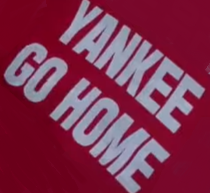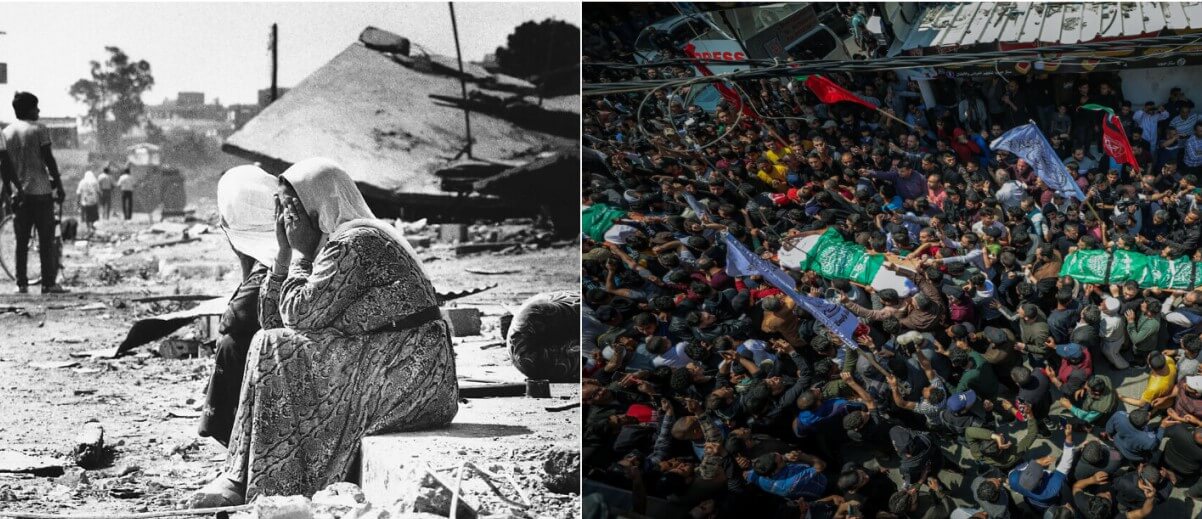Excerpts:
Forty-one years ago, I was in Lebanon leading a group of ten U.S. relief and development directors hoping to introduce them to the extensive needs of impoverished Lebanese and Palestinian refugees. On June 4, 1982, around 3:00 p.m., we were on our way to the crowded Fakhani district of Beirut when a fleet of Israeli warplanes (U.S.-made F-16s) roared in from the Mediterranean Sea, dropping bombs on the area we were about to visit. We took cover in a hotel basement. After the bombing subsided, I phoned our hosts, who proposed we meet them another day as they were busy searching for survivors from the bombing.
We visited a Red Crescent hospital near the Sabra and Shatila Palestinian refugee camps the next morning. We were taken to a hospital wing that had been struck by the Israeli bombing the previous day. Suddenly air-raid sirens went off and we were rushed to the basement with the patients and hospital staff. Again, Israeli F-16s were bombing various targets in the area. About twenty minutes later a series of ambulances arrived at the hospital’s emergency entrance and unloaded stretchers carrying teenage girls — some having lost limbs and others enduring severe burns. Hospital workers had just unloaded 19 body bags with girls who had died.
Later, we learned that the UN staff had provided the Israeli military with the route of the Palestinian girls’ field trip, but the military commanders chose to ignore the information, and the three clearly marked UN school buses were targeted on the coastal road.
Sickened by this savagery, I felt we had to tell this story to a U.S. media outlet. We found the addresses and phone numbers of the CBS, ABC, and CNN Bureaus but only NBC answered. Mike Mallory, the NBC Bureau Chief, agreed to interview us. He warned us that all of their recent dispatches were cut by Israeli censors in the New York studios. He conducted a twenty-minute interview with our group, based on what we had witnessed. We learned later our interview was also rejected.
We left Beirut on Tuesday, June 8th, and when I landed in Paris, I called my staff, asking them to arrange media interviews the next day. One memorable interview was scheduled for Wednesday, June 9, with WMAQ, NBC-TV in Chicago … I would be interviewed in Grant Park while an Israeli General would be opposite me in the studio.
He began the interview by stating that Israel was conducting a defensive war with “surgically precise bombings to root out PLO terrorist nests.’” I challenged his narrative, claiming Israel started the unprovoked war on June 4. I noted that, according to the Red Cross, most of the casualties were civilians. I gave several examples of the casualties, including the hospital wing hit by Israel on June 4 and the tragic case of the school girls with 19 dead and several wounded on the morning of June 5. The General was clearly upset by my remarks and then he said something that astounded me. “This is our final solution to the Palestinian problem.”
Having pursued extensive studies of the Nazi Holocaust, I communicated my shock, remarking, “I can’t believe what you just said, General. Isn’t this “final solution” language what the Nazis used concerning your people, the Jews? You, sir, have just endorsed genocide, wiping out an entire people, innocent men, women, and children. If this is Israel’s plan it is a war crime.”
The General tried to soften his statement, but I suggested that a proper response would be for him to apologize to the viewing audience and to the Palestinian and Lebanese people. When I returned to the office, Tim Weigel called and said the NBC switchboard lit up with more angry calls and threats than they had ever experienced. The news director said this was my last appearance on NBC-TV, which seemed a small price to pay for telling the truth.
Today we see members of Netanyahu’s Cabinet calling for “wiping out” entire Palestinian communities (Huwwara) and militant setters chanting, “We will replace you.” Meanwhile, western governments, led by the United States, refuse to hold Israel accountable for the murder of U.S. citizens (the journalist Shireen Abu Akleh) let alone the daily murder of Palestinians by the army and militant settlers. Gaza is bombed routinely with no accountability for those perpetrating the crimes. The Nakba of 1948 continues daily in multiple forms, and the conditions are ripe for another massive Nakba, echoing General Shromi’s chilling words: “This is our final solution to the Palestinian problem.”
A younger generation of Jews, Christians, and Muslims is rising up in Palestine and globally, applying the above analysis and organizing a global grassroots movement grounded in justice and only justice. They do not have the patience and timidity of my generation. They have learned from our failures and will not make the same mistakes in abandoning the liberation for the Palestinian people. They do not support an exclusivist Jewish state in any part of historic Palestine. Nor will they be intimidated by false accusations of antisemitism, bullying, and even death threats. Some are religious, and many are secular, but this matters little. They are committed to uniting across all lines of division and will not allow the divisive tactics of racism to thwart their quest for unity.
I know this generation understands both the urgency and utter crisis the Sheikh in Sabra and Shatila expressed in the wake of the Sabra/Shatila massacre: “Just tell the truth.” The mask is off. The impotence of the United Nations regarding Palestine has been exposed clearly by legal scholars and historians. The future will not be easy, nor will Palestine be liberated soon. The future is not with top-down political and military solutions. The future is with a massive grassroots global movement for justice in Palestine. A new day has already dawned, and the Zionist leadership knows they are losing credibility worldwide. Everyone is needed to join the global grassroots alternative to the Zionist settler colonial project that will continue the daily genocide of Palestinians.


